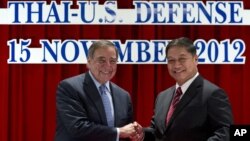BANGKOK —
The United States and Thailand have renewed long standing military ties with an agreement signed in Bangkok during a stopover by U.S. Defense Secretary Leon Panetta on his Asian tour. The new agreement is aimed at strengthening the Thai military’s role in regional and maritime security.
The guard of honor greeted Panetta Thursday at the Thai Defense Ministry as the two countries reaffirmed a 50-year-old military agreement dating back to the Vietnam War.
Thai Defense Minister Sukampol Suwannathat told reporters the agreement did not create any new initiatives or privileges between the two countries.
Secretary Panetta said the pact was aimed at confronting the new challenges from natural and manmade disasters as well as transnational threats and maritime security issues seen over recent years.
“Today the minister and I moved this alliance into the 21st Century by signing a joint vision statement that will help pave the way for even stronger military to military ties as we adapt to the shared threats and challenges that we will face together in this region and in the future,” he said.
The agreement covers areas of regional security in Southeast Asia, supporting stability in the Asia Pacific region and enhancing the readiness of joint armed forces operations and a strengthening of the bilateral defense relationship.
Panetta said the agreement aimed to boost the Thai military’s role in regional security as well.
“As we focus on these areas of cooperation, I want to convey that the United States remains committed to helping the Thai military further develop its already impressive capabilities so that it can assume even greater security responsibilities in this region, particularly in maritime security and in humanitarian relief and in peacekeeping operations,” Panetta said.
The 1962 agreement was written at the time of war and political instability in Southeast Asia and as a counter to Communism’s rise of influence. Thailand played a pivotal role during the Vietnam War years, with Thai airbases used to launch U.S. air attacks.
The alliance comes as the United States refocuses on Asia and with China’s growing influence in business and military ties with Thailand. Panitan Wattanayagorn, a political scientist at Thailand's Chulalongkorn University, says keeping a balance between the U.S. and China will be a challenge for Thailand.
“It is quite challenging for Thailand to make sure that she doesn’t move too much into the U.S. orbit at the same time continue to engage with more activities, especially in the security area, with the Chinese in the years to come. And that has to be kept up in order to make sure that the Chinese don’t feel left out,” Panitan said.
Panitan said overall the renewed pact should be “quite positive” for Thailand. China has been invited with the U.S. and Thai forces in the annual military exercises in Thailand known as ‘Cobra Gold’.
Analysts say the pact’s renewal also reflects the realities and challenges Thailand is likely to face in the near term with an economy now heavily industrialized and urban, a far cry from the dominant agricultural society of half a century ago.
The guard of honor greeted Panetta Thursday at the Thai Defense Ministry as the two countries reaffirmed a 50-year-old military agreement dating back to the Vietnam War.
Thai Defense Minister Sukampol Suwannathat told reporters the agreement did not create any new initiatives or privileges between the two countries.
Secretary Panetta said the pact was aimed at confronting the new challenges from natural and manmade disasters as well as transnational threats and maritime security issues seen over recent years.
“Today the minister and I moved this alliance into the 21st Century by signing a joint vision statement that will help pave the way for even stronger military to military ties as we adapt to the shared threats and challenges that we will face together in this region and in the future,” he said.
The agreement covers areas of regional security in Southeast Asia, supporting stability in the Asia Pacific region and enhancing the readiness of joint armed forces operations and a strengthening of the bilateral defense relationship.
Panetta said the agreement aimed to boost the Thai military’s role in regional security as well.
“As we focus on these areas of cooperation, I want to convey that the United States remains committed to helping the Thai military further develop its already impressive capabilities so that it can assume even greater security responsibilities in this region, particularly in maritime security and in humanitarian relief and in peacekeeping operations,” Panetta said.
The 1962 agreement was written at the time of war and political instability in Southeast Asia and as a counter to Communism’s rise of influence. Thailand played a pivotal role during the Vietnam War years, with Thai airbases used to launch U.S. air attacks.
The alliance comes as the United States refocuses on Asia and with China’s growing influence in business and military ties with Thailand. Panitan Wattanayagorn, a political scientist at Thailand's Chulalongkorn University, says keeping a balance between the U.S. and China will be a challenge for Thailand.
“It is quite challenging for Thailand to make sure that she doesn’t move too much into the U.S. orbit at the same time continue to engage with more activities, especially in the security area, with the Chinese in the years to come. And that has to be kept up in order to make sure that the Chinese don’t feel left out,” Panitan said.
Panitan said overall the renewed pact should be “quite positive” for Thailand. China has been invited with the U.S. and Thai forces in the annual military exercises in Thailand known as ‘Cobra Gold’.
Analysts say the pact’s renewal also reflects the realities and challenges Thailand is likely to face in the near term with an economy now heavily industrialized and urban, a far cry from the dominant agricultural society of half a century ago.




